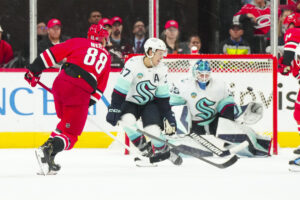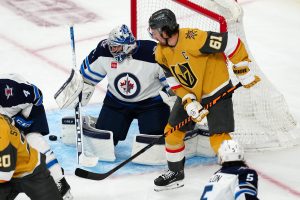There’s nothing more frustrating than watching your favorite team lose a game. It’s even worse when it seems like the officials are at fault. A missed call here, too soft of a call there, and suddenly the entire game rests on the shoulders of the men and women in stripes. Fans, and sometimes players and coaches, are quick to blame the referees when they feel a game was called unfairly. But officiating a game is more difficult than it looks because NHL referees have the hardest job in the sport of hockey.
NHL Referees Have Most Difficult Job in Hockey Games
NHL referees do not get enough credit for the work they do. Linesmen also are strong skaters and the best at what they do, but referees have a more difficult task, so this article will focus on them specifically.
Skating
The most overlooked aspect of a referee’s game is their skating. They are out on the ice for 60 minutes, every game, night in and night out. Players get to change and take breaks, referees do not. Remember Game 1 of the Columbus Blue Jackets and Tampa Bay Lightning series, the one that went to five overtimes? This was the fourth-longest game in NHL history, lasting just over six hours.
The referees were out there the entire time. That’s well over 140 minutes of skating. The refs’ only breaks were pauses in the action, while they were likely hoping the puck stayed in one end for a while.
But it’s not just endurance referees need. They need to be able to keep up with the best skaters in the world. And they do. Referees are as good, and maybe better skaters than the players.
Not as fast most of the time, but they need to be able to maneuver themselves around play without interfering, change directions quickly with the players, and hustle to get in position on fast break opportunities. The training that goes into being a professional referee usually goes unnoticed and under-appreciated.
Standard of Play
Many hockey fans have heard this term used before, especially in the playoffs. Essentially, it means how many penalties the referees are calling during play and after the whistle. During the regular season, missed calls usually are talked about for maybe the rest of the game, and then forgotten.
For the referees, blowing a call might mean fans go home a little upset, and a team doesn’t get the two points they were hoping for. But in the playoffs, every call is under scrutiny. Missed or bad calls are talked about for days, weeks, and if they’re bad enough, even years after the game.
During the postseason, referees usually go by the “let them play” standard, where the games are called with fewer penalties. But in a league as physical as the NHL, calling penalties on illegal checks and stick fouls can be difficult.
For example, in a rough and physical game, calling a cross-check after the whistle might be met with the classic phrase, “the other team did it too!” Referees must stand their ground and be able to clearly communicate to an upset player or coach why they called a penalty — a more difficult task then one might imagine.
Consistency
The biggest issue facing referees — glaringly obvious in the 2020 Stanley Cup Playoffs — is consistency. There needs to be some baseline expectations for what will be called in a series, and if those are constantly changing, players and coaches get confused and angry. Especially when the inconsistent call doesn’t go their way, it is impossible to understand why.
Using precedent is helpful for referees to explain why they made a call they did, circling back to the consistency issue. In this year’s postseason, there seems to be issues with this. Even within games, there seems to be a lack of rhyme or reason as to why some of the calls were made. This creates tension between players and referees, especially in more physical games.
The balance between calling too many and too few penalties is a very fine line, and referees must walk it every single game. With millions of fans and hundreds of players constantly judging your performance, it seems like an overwhelming task. But the referees at the professional level are just that — professionals. They make mistakes from time to time, but so does everyone at every level of hockey. More times than not, if NHL referees call a penalty, it was warranted, even if it’s against your favorite hockey team.
Main photo:






